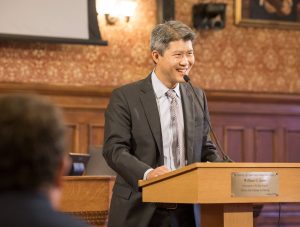City council race: Jon Spillane running for at-large seat
August 2, 2021
Jon Spillane, previously the Director of Budget and Constituent Services for Councilor Kenzie Bok, is running for one of four Boston City Council At-Large seats.
Spillane is running against at least 17 other candidates, including incumbents Michael Flaherty and Julia Mejia. Incumbent Councilors At-Large Michelle Wu and Annissa Essaibi-George are running for Boston mayor.
The 30-year-old candidate, who is a bar-certified attorney, is running on his experience in City Hall, including working in Councilor Bok’s office and on former Mayor Marty Walsh’s Spark Boston Council, which advises the Mayor on policies and programs affecting residents aged 20 to 35.
Born and raised in Boston, Spillane said he plans to bring his perspective as a young professional living in Boston to the city council. “A lot of times, younger people in our city want to be engaged, but I feel like there’s a disconnect on how to fully engage those persons,” he said. “The city has a lot of resources that we can offer, and finding a way to effectively communicate that to a younger generation, I think, is very important.”
His campaign’s key issue, Spillane said, is affordable housing.
“I think housing stability, almost more than anything else, impacts the trajectory of someone’s life,” he said. “Having to constantly worry about moving or having security, it really impacts people’s ability to flourish in other spaces.”
The Scope spoke with Spillane about his campaign’s top issues and plans to address them if elected City Councilor At-Large. This interview has been edited for length and clarity.
What has your experience been like living and working in Boston?

I [am] a lifelong Bostonian, and I was born and raised in the Hyde Park neighborhood. I’ve actually never lived outside of Boston. Every part of my life’s been shaped by growing up in the city of Boston; whether it was learning to ride the MBTA, going to high school and learning the hard lesson of missing a bus line and trying to figure out how to get home if you hop on the wrong bus route, going to local sporting events.
I’ve played Hyde Park youth football in Hyde Park baseball, making a lot of friends in the neighborhood. It’s really shaped who I am as a person, the fact, the city has given me a lot in terms of the friends I’ve been able to make, the experiences I’ve been able to have. I learned how difficult that is to navigate the housing situation in Boston right now, that it’s a tough rental market [for] a young professional in Boston, which I know a lot of people my age are experiencing.
I’ve seen the difficulty of having an elderly member of my family and face the difficult truth that the city’s cost is rising rapidly, having the ability to put them in senior housing within the city limits. Whether it was the experiences that I had as a young person in Boston growing up…or currently working as a young professional, it’s kind of a sum of all the parts. It’s been shaping who I am…I think almost every emotion I’ve ever felt is taking place in the 23 neighborhoods, so [Boston] is something that means a lot to me.
You touched on a few problems in Boston, namely the rising cost of living and housing costs. Are these the key issues on your platform, or are there any other key issues you’d like to bring forth?
I would say housing is the top issue for me. I think it’s the top issue facing the city of Boston. Whether it’s a young family looking to lay roots down in the city, or our older population trying to stay in the city of Boston, it’s a difficult thing.
My personal experience working for the city of Boston has been formed around working in affordable housing space. I worked for three and a half years at the Department of Neighborhood Development, working on the development, planning, financing, and budgetary planning, financing for over 1,000 affordable housing units throughout the various neighborhoods in the city. I’ve had those meetings where I was hosting meetings in a lot of our neighborhoods where affordable housing is a big issue. It’s a really difficult thing to try to answer when someone says, ‘What about me and my family? We’re not able to afford to live in the city.’ It’s a tough conversation to have.
I think there are some ways the housing process in Boston can improve. We need to do an overhaul of our zoning; I think we need to create a permit incentive process where developers who opt to include more affordable housing and their development can have a sort of permitting priority.
We also want to incentivize more affordable housing development. Councillor Bok, who I previously worked for, had a great point where she highlighted that the city’s not maximizing our Faircloth funding from the federal government. So [we should] make sure that we’re utilizing as much funding as we can, really focusing on the development of more affordable housing. Right now, the city of Boston is in a very tenuous position, with the eviction moratorium set to expire at the height of COVID. As our director of constituent services, working for Councilor Bok, some of the most difficult calls that I received what was from people from all walks of life who were afraid of facing eviction. [At] the height of COVID, they weren’t able to go to work because a lot of small businesses that they operated in weren’t open for business.
It’s a tough conversation when you have an 80-year-old veteran who’s calling you because he’s more worried about being evicted at the end of the month. Similarly, a single mother who is facing that same difficult position at the end of the month.
So that’s where I like to think that [because of] my experience working for the city, I can really step in and help. I have a lot of background in the city services that we offer. Those people that called our office, I was able to know who to connect them with because of my experience working over at the Department of Neighborhood Development, and I worked really close with the Office of Housing Stability. So housing is definitely a big issue for me. I think housing stability, almost more than anything else, impacts the trajectory of someone’s life. My grandfather actually grew up in the Old Colony housing projects in Southie. He had that housing structure that he was able to move my family to Hyde Park eventually via a single-family house. So it’s important to have that stable structure because it lets you really have a stable environment that leads to growth. And having to constantly worry about moving or having security, it really impacts people’s ability to flourish in other spaces. So housing is definitely a major issue for me.
What motivated you to run for the At-Large seat?
I think it was kind of a mix of a couple of different factors. So I think when you’re running for an At-Large seat, there are two primary responsibilities you have: 1) You act as a backstop to help with constituent service issues in whatever district that they’re occurring in. So you’re working as a partner with that district’s city councilor. And 2) The second aspect to it is identifying issues throughout the city that are parallel.
I like to highlight you know there’s a big issue going on right now, over by Fenway and South Boston, where a lot of those roads are state-owned. So if an incident occurs on those roads, there’s a lot of times there’s a mix-up of who do we call. So [At-Large City Councilors can] identify those parallel issues in different neighborhoods and try to work with our state partners.
There’s a lot of turnover going on right now with the Boston City Council; you have five or 13 seats to open up. [Among] the eight City Councilors that are remaining, only four have had more than one term of experience. It [is] a perfect time, I thought, to really step into that role where I have experience in a lot of issues facing the city.
We have two incumbents running for City Council At-Large, you know. I think having someone that’s worked in the City Council within the last decade that was working on a lot of these issues just last year, whether it’s looking at reassessing PILOT payments. I was in the room talking to the universities and the Mayor’s administration, so I’m familiar with where the conversations are.
Being the youngest person in the race — a large portion of our city are young professionals — having that brain, being able to bring that viewpoint to the Council, the city of Boston’s government has kind of always been a lifelong passion of mine — my parents were very involved in the early 90s. Tom Menino grew up [on] the streets over from me… — so [city government] was always something that I was kind of enamored with. And this just felt like the right moment when I could bring the skill set that I have and really address some of the city’s issues.
You mentioned being one of the youngest candidates in the race and bringing forth that viewpoint to the Council. What are some examples of this viewpoint?
It’s really just being able to effectively communicate. A big issue I’ve found is that many times, younger people in our city want to be engaged, but I feel like there’s a disconnect on how to fully engage those persons. The city has a lot of resources that we can offer, and finding a way to effectively communicate that to a younger generation, I think, is very important.
[The city could also] try to be innovative in how we use social media [or] try to be a little more innovative in the type of pop-up shops that were opening throughout the city.
I like to highlight that I worked for or I was part of Marty Walsh’s SPARK Boston Council, which was the Council of millennials in Boston. Our main goal was to try to increase the level of civic engagement in the city of Boston. I was on the Council during the 2016 presidential election, and one thing that we tried to do was set up events throughout the city, where young people could go there and engage in the event, and then we would all walk down to the polls together to vote. We did yoga on the beach in East Boston; we did an art gallery show on the South End, you know, really trying to be innovative and activate these wonderful spaces that a lot of our young people in Boston interact with. I’m really excited to see some of the innovation we’ve had come out the last couple of years in terms of, you know, beer gardens opening up on the Esplanade, things like that.
I think there’s a little further we can go. One of my ideas is in regards to how to utilize our CPA [Community Preservation Act] funds a little bit better with our parks. For example, our art community has been devastated, particularly during the COVID epidemic. I would love to try to have interactive art installations utilized at public parks, so we’re able to utilize CPA funds with an eye towards art inclusion.
How do you think your background prepares you for this job?
I think I’m one of the few candidates who’s worked in City Council. Because of that, I think I’m able to step in. I highlighted earlier when someone’s facing eviction at the end of the month, having that familiarity with how to best navigate the city process can make a dramatic difference in someone’s life — not having to build the ship as you go.
It’s having that familiarity with a lot of the issues that the city is currently facing and a lot of the conversations that are going on between the mayoral administration and the City Council. It’s having a good potential working relationship with our city councilors and state legislatures, state officials, where I have a familiarity with them [, and] worked with them in the past. I think having a personal relationship can really shape the effectiveness of someone operating in this role.
I think experience is going to be huge. Again, we have five of our 13 city councilors turning over, [among the] remaining eight, only four of them are coming out of their first term. I work for Councillor Bok’s office. I worked with Councillor Edwards’ office about the participatory budget amendment. It’s having experience working on policy; it’s having experience working with constituent service and familiarity with different neighborhood groups. Then, there’s that experience of just being someone who’s lived in Boston their whole life.
I think there’s a unique line I can walk where I understand what it’s like to have an aging family member in the city of Boston, but I also understand the frustration that a lot of young professionals face when they first moved to the city of Boston. A lot of my friends have moved here recently, and it’s a really tough city to navigate if you haven’t gone to college here. I think that’s a unique perspective that I think I’m able to bring to the city council.
It’s interesting that I’m the youngest candidate. I also think I had some of the most experience working in Boston’s City Council and city. So I think activating my personal experience, and my unique perspective can really render some innovative policy ideas to the city of Boston as well. I’m able to bring new ideas based on my unique perspective [but] I also understand what can be fixed in the [current] system. It’s tightening up areas where we can improve as well as bringing new ideas. There are some areas that the city can improve by just increasing our staffing. I know that’s not a catchy headline but working in the city, you understand that sometimes we just need to add a few more architects to help push through more affordable housing because there’s a capacity issue. It’s small things like that that you would really only have a view on based on working inside the [City] Hall.
What is something you think is working in the city of Boston and what can be changed, and how would you go about changing it?
Something that’s working in the city of Boston, I think, is our ability to adapt. It is something that I think we’ve really seen improve over the last few years, especially during COVID. We switched to an entirely Zoom-structured public process for meetings [and] were still able to deliver a lot of great city services. Particularly among [those services], delivering meals to elderly citizens of Boston was something that I was really impressed with.
We have a lot of leaders who are dedicated to helping the citizens of Boston innovate when we face tough times. It’s the fact that any senior who needed [and] who was too afraid to leave their homes due to COVID because they were afraid of exposure, that those people could call and we could help them deliver meals, was incredible. And that was something I experienced working in Kenzie [Bok]’s office, and I give all the credit to the city of Boston Age Strong team for helping us do that.
Where I think we can improve, though, is we shouldn’t only innovate when we face difficult times; I think we should always be innovating to try to create better processes. I think part of having an older city operated for so long, particularly with only a few mayors, is that we get stuck in our same routine on how to operate, and we kind of lose our spark and look towards innovation.
We should always continually be looking to make things more accessible, more innovative, not only when there’s a global pandemic. I think we can get our services out and more into the neighborhoods. Under Mayor Kevin White’s administration, they had little City Halls set up in all the various neighborhoods. I think that’s something that we should bring back. If you need to pay a parking ticket or register your car, get a birth certificate, you should be able to go down to your local library, where there’s a local staff. Having those services more accessible in the neighborhoods, particularly among our older population, will make them a lot more accessible and easy to navigate.
Is there anything else that you wanted to share that I didn’t ask you?
I think the city of Boston’s in a unique position to really dictate the direction our city will go with over the next decade. We’re receiving millions of dollars of federal relief funding [during] COVID. We see what worked and what didn’t work in our processes. We really need to take a hard look and figure out how to innovate and create better processes, especially with our small business communities.
I feel like there’s a lot of red tape that we have to cut out to make it easier to open a business. We should be incentivizing and encouraging people to open small businesses. We shouldn’t be making it more difficult through bureaucracy and permitting and zoning. We’re gonna have a new administration coming in, we’re going to be having a lot of different councilors come this fall, and we’re going to have a lot of federal money.
We really need to take this opportunity to really innovate, really look to change and improve things, using that money on capital projects, improving our school buildings — I think 60% [of which] were built pre World War II — creating world-class primary schools.
We should really look at [how] we structure our business permitting process to help businesses trying to recover from COVID truly succeed. We’re not talking about why not having 12-month outdoor dining, trying to encourage our businesses to operate. We should also discuss the fact that we have an aging workforce within the city of Boston, which a lot of people aren’t discussing, and it’s something that I know just based on my experience working for the city. A large portion of our municipal employees were hired during Menino’s administration, and a lot of them are reaching retirement age. We’re gonna have a huge vacuum of experience walking out the door, so we need to start looking forward and trying to preemptively backfill those positions so that all that knowledge doesn’t walk out the door at once.
I’m hitting a couple of different areas, but I want to make sure that we’re really preparing for the future we’re innovating, but we’re also being preemptive and addressing issues. If COVID comes back this fall, how are we going to deal with outdoor dining and mask mandates? If we have a mass retirement occurring at City Hall, how are we going to deal with that? I feel like we’ve had a lot of policies that are very reactive. I think we need to be proactive [in] dealing with a lot of these issues and being forward-looking on how to improve but also being presented and how to address future problems.


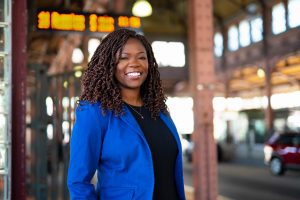


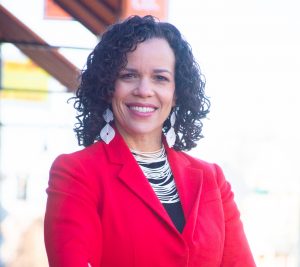
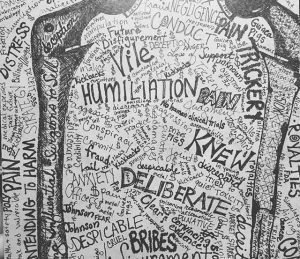
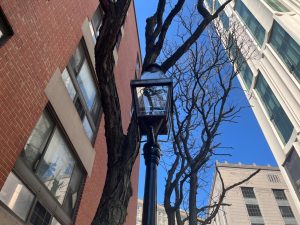
![Worcester, MA — Pearson’s recent piece “Lipstick on a Pig” contends with her self-perception. The title of the painting came to her first, “fixating in [her] head quite a lot,” Pearson said.](https://thescopeboston.org/wp-content/uploads/2024/03/2-300x200.jpg)

